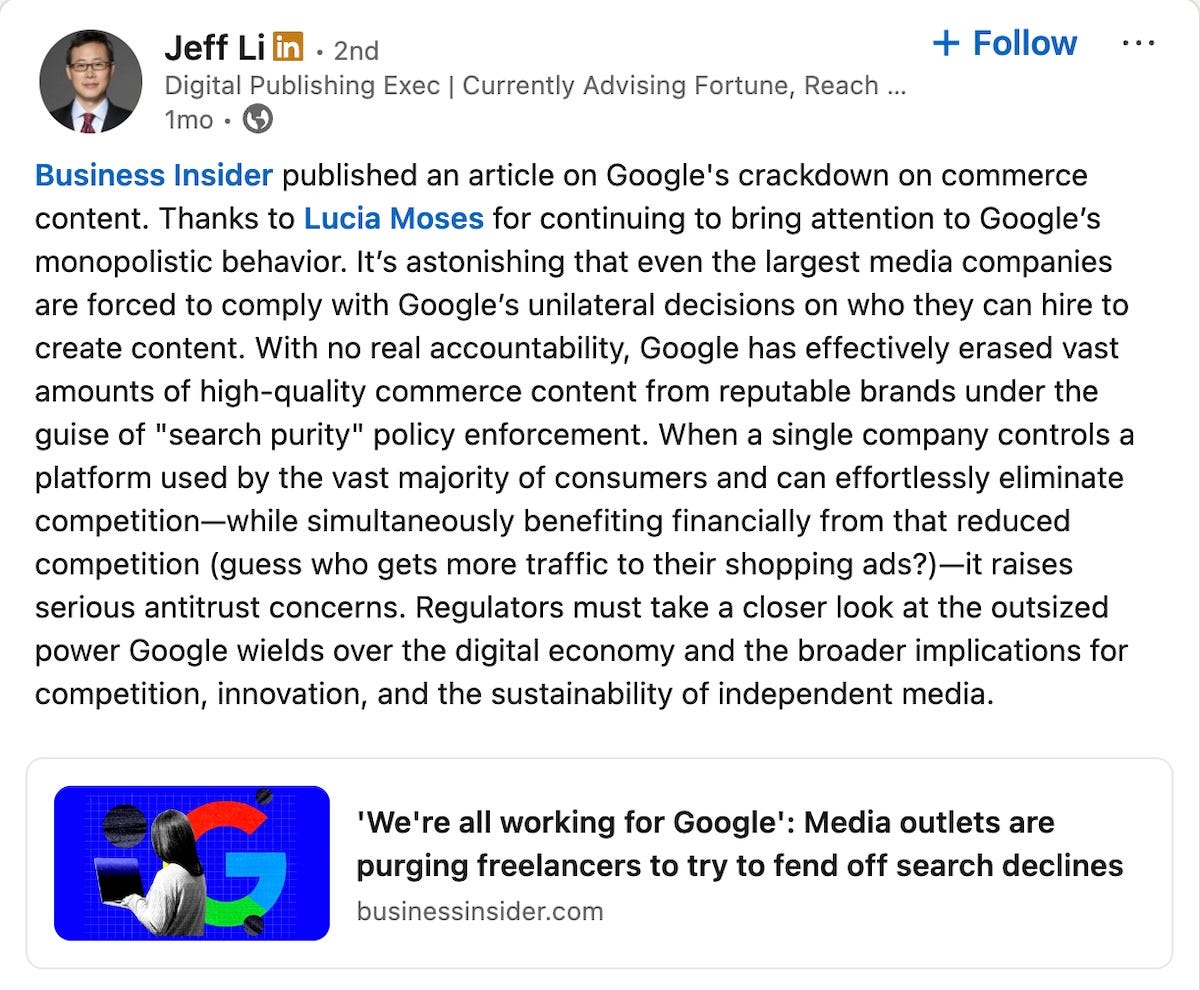Group Chat Litty: Google's War on Freelancers
The tech giant is making it harder for independent writers to make a living.
Did you know that Google hates freelancers?
That may sound harsh, but it’s exactly how the tech giant is making writers feel these days.
If you’re not in the digital publishing industry, you may not have heard about Google’s Site Reputation Abuse Policy, which launched in March 2024 and was updated in November. While the policy is meant to dissuade publishers from trying to “game the system” by pumping out affiliate and low-quality content for page views and revenue, what it has actually done is scare companies into firing their freelancers.
Now, writers who had been enjoying steady relationships with big sites are being boxed out. In some cases, their bylines are even being erased. And for anyone who’s looking for new work, it’s even harder to find in an already tough job market.
Let’s break down why this is happening—and if you’re a digital freelancer, what you can do about it. Oh, and feel free to react to all of this in the comments or in our Subscriber Chat… let’s get this Group Chat Littyyyyy.
Understanding Google’s Site Reputation Abuse Policy
Previously, I’ve covered how powerful Google is at running the Internet (at least, for now), and why it’s so important for those working in digital media—or any business owner who wants online visibility—to understand its policies.
Playing by Google’s rules means your content or site will rank higher in search results (even though it will now fall below AI summaries). Violating their rules means your content or site may be slapped with warnings and demotions that could essentially wipe you from existence.
This is why publishers like to follow the rules.
Last year, the rollout of Google’s Site Reputation Abuse (SRA) Policy was a sign that it knows there are some bad actors out there who are trying to take advantage. They do this by flooding their own high-ranking and authoritative sites with what Google calls “third-party content”:
“Third-party content is content that's created by an entity that's separate from the established host site. Examples of separate entities include users of that site, freelancers, white-label services, and content created by people not employed directly by the host site.” - Google
Yes, freelancers are considered third parties. Staffers are first parties.
From my understanding, Google thinks third-party content is problematic if it’s trying to gain page views or make money from efforts that are opportunistic and not core to the brand.
Google offers these as examples:
“A medical site hosting a third-party advertising page about "best casinos" that readers wouldn't expect and that's being placed on the site to rank better due to the established site's ranking signals”
“A news site hosting coupons provided by a third-party white-label service where the main reason for publishing the coupons on the news site is to capitalize on the news site's reputation”
OK, those sound totally fair. Ding those sites for trying to capitalize on their audience in sneaky ways.
But, here’s where freelancers unfairly get caught up in the mix…
The Gray Area of Freelancers
Since freelancers are considered third parties, publishers are now confused about whether or not their contributions are problematic.
As Google states, “While freelance content is third-party content, freelance content alone is not a violation of the site reputation abuse policy. It is only a violation if there is ALSO an attempt to abuse search rankings by taking advantage of the host site's ranking signals.”
Riiiight. I don’t know how you’re reading that, but to me and many others, this distinction isn’t enough to clear things up.
Even worse, it’s causing publishers to view content written by staff as safer than anything written by a freelancer.
Search Engine Land uses these examples to explain:
“If a news site known for quality travel content—written both in-house and by third parties—hires a freelancer to write about the best cruises for families (even with affiliate links), that’s fine.
However, if a respected business news publisher, known for its in-house stock market and financial reporting, starts covering gaming and assigns a freelancer to write this content, that could violate Google’s policy.
If the same publisher were to task in-house writers with the exact same content, it would be acceptable.”
You see? There’s a lot of gray area. So, rather than try to understand the nuances, many companies are doing away with freelancers and bringing all written content in-house.
Freelancers Are Now Competing With Staff
This means that, whether it intended to or not, Google has started a war with freelancers by pitting them against staff writers.
Take a guess who’s winning.
In December, The Verge reported that Forbes had fired many freelancers and was no longer hiring any new contract writers for certain sections of the site (which reports suggest were directly violating Google’s SRA policy, and Forbes was notified).
Two months ago, Business Insider reported that Dotdash Meredith, which owns People, Better Homes & Gardens, Byrdie, Real Simple, and many other popular magazines and sites, also cut ties with many freelancers after getting dinged.
“[DDM has] also been unpublishing their articles and reassigning them to in-house staff, according to three insiders and documents seen by BI,” the article said.
Jeff Li, the former general manager of digital at Time and current revenue consultant for Forbes, told BI: “Publishers are going to great pains to show the Google algorithm the content is being produced in-house—it's all being done by fully employed staff.”
He’s also been very vocal about the topic on LinkedIn:
What You Can Do About It
If you’re like, “Wow, this is messed up. How are freelance writers supposed to make a living?” You’re not alone.
Everyone from the UK to Italy and, oh yeah, the U.S. again, is suing Google right now for its monopolist and anticompetitive practices.
To be fair to them on this one point, I don’t think they meant to demonize all freelancers and do believe they intended to scare and penalize bad actors… it just rippled into a larger ethical issue that they can’t undo.
In the meantime, writers are reeling. What was once a healthy landscape of sites and digital magazines looking for talented contributors who are experts in certain areas—be it fashion, lifestyle, news, politics, climate change, tech, travel—is now a much quieter and more competitive playing field. (Plus, staff writers are now working overtime with less outside relief.)
But, there’s hope.
If you’re a freelancer who’s looking for work, you have several options to find new writing gigs:
Pitch print magazines. Luckily, they don’t have to play by digital rules!
Look for content opportunities with consumer brands. Unlike traditional media outlets, brands like UNIQLO and Chomps have strong built-in fan bases, so they’re not relying as heavily on Google Search rankings.
Search for short-term contract work. Publishers with big special projects or events will need additional help, and your name won’t be the only contributor listed. Check for opportunities like U.S. News & World Report’s “News Awards Project” contract writer position.
Try app copywriting. The content within an app is also exempt from all of this search engine ridiculousness.
Launch your own Substack. Despite what recent headlines show, some of us are very welcoming and not threatened by newcomers.
Don’t give up. For every publisher who’s souring on freelancers, there’s another who doesn’t give a hoooot about Google’s complicated policies. Elna Cain, a professional freelance writing mentor whose newsletters I receive, recommends ProBlogger as the best place to find new job listings. (If you try it, please report back!)
I like to believe that there are enough outlets out there that are producing quality content for their audiences—search engines or AI results be damned.
I also like to believe that as long as there is content, there will be countless opportunities for writers (and wannabe writers!) to share their thoughts, research, stories, and prose with the world. These are just some crazy times that we need to navigate through.










Interested to see how this plays out in the legal system. Not an industry expert, but this seems absurd.